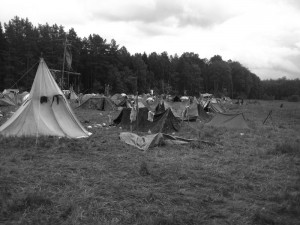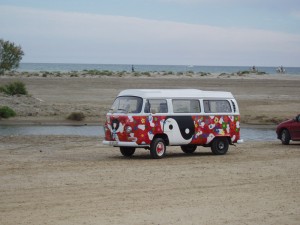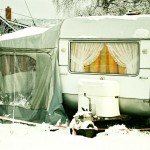The History of Camping
 How it all Began
How it all Began
Camping has been around almost as long as man. Tents have been used as shelter by native americans, armies on the move and for many other things. But it is only since late Victorian times that camping has been thought of as recreation.
Thomas Hiram Holding was a British traveling tailor and often considered the founder and father of modern camping. His passion for camping developed as a child when he crossed the United States including the American prairies with his parents in a wagon train heading for the Oregon Territory, so he’d learned all the ways of camping from a very early age. A well-travelled man, in the 1880s he took a canoe and camping trip in Scotland. He wrote the first edition of ‘The Campers Handbook’ in 1908 and founded the Association of Cycle Campers, now known as the Camping and Caravanning Club.
One of the First Campsites
One of the first campsites was the Cunningham Camp in Howstrake on the Isle of Man, which is believed to have opened in 1894 and initially was only for use by male campers. It opened for the summer season and expanded continuously in terms of size and visits over the over the following decade. By the end of the 1800’s it was attracting over 600 people per week, In 1904 another 4 acres of land was purchased in order that an additional 1500 tents could be erected, alongside this a 100 foot dining marquee was pitched to act as a dining hall.
 Over the Years
Over the Years
During the 1920’s and 1930’s a healthy lifestyle was greatly sought, thus the ‘outdoors’ character of camping made it extremely popular. The growth of recreational camping slowed a down during the Second World War but picked up soon afterwards, helped by the growing number of cars on the road.
In the 1960s this grew so that camping became the standard for family holidays, saving holiday makers a great deal of money, and soon campsites were more populated than boarding houses which were the previous norm. The quality of camping gear was improving and its weight coming down. Suddenly camping holidays offered a viable alternative to the restrictive boarding house experience, one which many people eagerly grasped. Others opted for caravans, although these required a car, a luxury which few people owned at the time.
Since the early 1970s more and more people have turned to camping, not only in the UK but all over the world. In the US the rise of the car after the Second World War saw more people on the road with tents, exploring the country in a manner not too dissimilar to their ancestors.With developments in technology camping has still kept its appeal today, and many people, inclunding myself, still choose camping as their preferred abode when going on holiday. Parks have sprung up across Europe where the elements are often much less of a battle, making holidaying abroad much cheaper and accessible.
More recently, the rise of the festival has brought thousands to camping, something they might first experience on a festival site and then come to love. It’s drawn in a young crowd to camping to join older generations who discovered it several generations before.
Camping has never been more popular. It gives freedom, it’s cheap, and it’s something the family can enjoy together.
Author: Rosie Austin
The CampTrip Team





Hello my name is Emma and I love this! Keep the good work up.